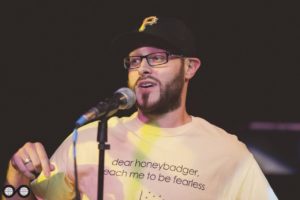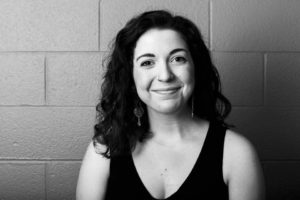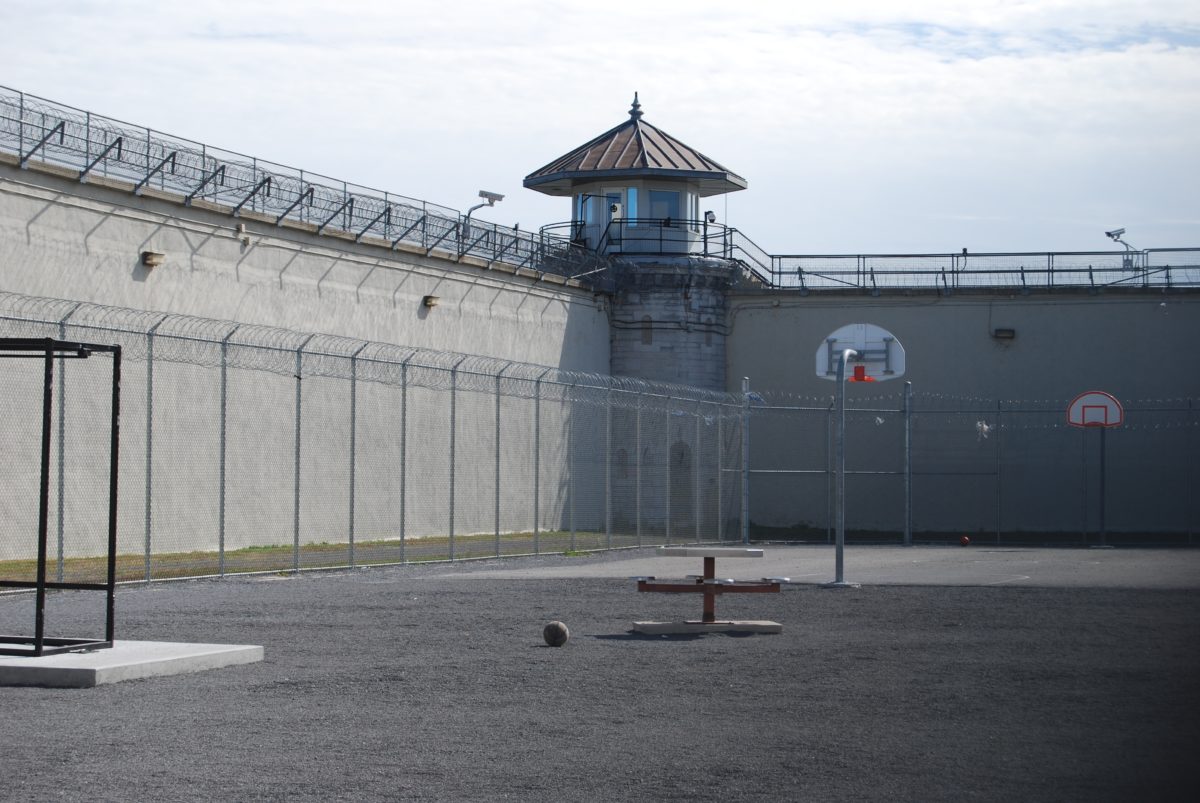Writers’ Block is a Nebraska Writers’ Collective program that leads incarcerated individuals to self-expression through creative writing and poetry. Writing is a medium through which those in the system can cope and have a voice in a space where they often feel voiceless. Through small group workshops, Writers’ Block provides men and women with valuable skills that reduce violence and emotional distress within correctional facilities and allow them to transition out of the system into employment. These workshops serve as a safe space for people to dream, work, and learn together.
Nicholas Bell was a recent college graduate in 2007 when he was struck with the inspiration to start Writers’ Block. He lived in an apartment above the Orpheum Theater, not far from a county prison in downtown Omaha, Nebraska. Driving by the Douglas County Correctional Center and its rooftop basketball court on his way home from work every day gave Nicholas an idea, and he and a close friend set out to host a poetry slam on that very roof.
After a number of roadblocks prevented Nicholas from hosting a slam at the Douglas County Correctional Center, he went to work for the Nebraska Writers’ Collective (NWC). A few years later he asked the universe, via Facebook, to help him achieve his dream of teaching writing in prisons. Through his work with the NWC he was able to lead his first writing workshop in 2015 at the Nebraska Correctional Center for Women in York, Nebraska with Professor Fran Kaye, who quickly became the catalyst for the growth of Writers’ Block.
Initially, Nicholas worked as an unpaid volunteer, but he knew that for the program to grow, he’d need to find a way to pay artists and teachers, which the NWC was in a position to do. From there, he developed a structured program model from donated funds and hired staff. And then he paid it forward, which seems to be a common theme with the NWC, a true collective and network of writers creating opportunities for each other to pursue their passions.
To help facilitate the monthly workshops he was leading in York, Nicholas reached out to fellow poet Gina Keplinger, a student at the University of Nebraska-Lincoln. Together, they led the women at the correctional center through the process of drafting and revising their own poetry, creating an outlet for them to explore their prior lives, experiences in the system, and goals for the future.
As Gina fell in love with her work with Writers’ Block, she approached her friend and colleague, writer Alexander Ramirez to join the program just a few months ago. Gina’s goal? To bring a rotating cast of artists into the prisons she visits in order to introduce her students to new voices and fresh perspectives. Ultimately, Gina brought Alexander on board to work with the men at the Lincoln Correctional Center in Lincoln, Nebraska.
Together, this powerful trio of creatives, along with the rest of the Writers’ Block staff and volunteers has brought poetry into the different locations where they work, creating a model that will allow Writers’ Block to grow.
When I asked Nicholas, Gina, and Alexander what their favorite experience with Writers’ Block has been so far, their unanimous answer was the poetry slam at the Lincoln Correctional Center (LCC).
On March 13th, Writers’ Block hosted the first-ever, three-round poetry slam at LCC, with over 20 volunteers serving as fellow poets, judges, and audience members. Each round, the poets were narrowed down, and each round, the poets performed a different poem, until two LCC men, Shaheed Khaleel Hamza and Terron Brown, tied for first place.
“Poetry can be beautiful on the page, but like theatre, it’s another animal when it’s performed. And it meant a great deal to the [men at LCC] to see, in person, that there are people on the outside who value their words, their thoughts, their feelings,” Alexander said. “It meant a lot to them to see that there are people willing to take time out of their day to come out and acknowledge the fact that they exist.”
Gina echoed Alexander’s sentiment. “The experience was particularly moving for me because I understood just how many gears had turned in unison over months of planning to pull those two hours off. . . It was humbling to see how many folks from various walks of life came together for these common interests of artistic endeavor, empathizing, and breaking down stereotypes.”
And that’s exactly what Writers’ Block is doing—breaking down stereotypes. Every educator who enters a prison never assumes anything about their students. As Alexander puts it, “When I’m teaching . . . I’m of the opinion that I belong to my students.” He, Gina, and Nicholas, along with so many others teach writing not to make their students better people, but because they know that writing is a kind of therapy that brings out the best in people that’s already there, and allows them to heal.
The Writer’s Block workshops extend beyond poetry, too. While Gina brings in poetry from Reginald Dwayne Betts, Andrea Gibson, Nancy Miller Gomez, and José Olivarez, Alexander, who is a fiction writer, provides expertise in flash fiction and memoir. “As one might imagine, many of the students at LCC are interested in writing their autobiographies,” Alexander said. “I teach because I want to share what I’ve learned because I think the only ethical thing to do with knowledge is to spread it.”
The March 13th slam is merely a jumping off point for what Writers’ Block will do. Gina’s hope is that the program grows into every carceral setting in Nebraska. “I hope people who are not incarcerated—teaching artists, graduate students, educators, rappers, writers, scholars, and young people—have the chance to enter a prison and meet the people inside and have a chance to shake their hands and exchange stories,” she says. Right now, Alexander and Gina are teaching monthly workshops at LCC, but students have been asking for weekly classes, so growing staff and making their dreams a reality is the only way up.
Writers’ Block can only happen with the support of their nonprofit, the Nebraska Writers’ Collective. They are always looking for more donors and volunteers, so to donate or to become a part of the NWC or Writers’ Block, check out the links here and here.
“To be honest, the best part of this work has nothing to do with the work itself. My favorite experiences are the moments when I run into formerly incarcerated writers I worked with out in the community once they’re free. Of course, there are moments even in prison where our writers smile and joke with one another, but nothing beats the smile of a newly freed man or woman. It’s just different. These are the moments I truly live for.” —Nicholas Bell
Bios:
 Nicholas Bell attended the University of Nebraska-Lincoln where he earned his Bachelors in Creative Writing. He then went on to pursue his graduate degree at Queens University in Charlotte, North Carolina where he received an MFA in Poetry. He works as the Community Outreach Coordinator for the Nebraska Writers Collective, where he helps run the annual youth poetry festival known as Louder than a Bomb. He is also the program director of “Writers’ Block,” which brings local artists into prisons throughout Nebraska to teach poetry workshops.
Nicholas Bell attended the University of Nebraska-Lincoln where he earned his Bachelors in Creative Writing. He then went on to pursue his graduate degree at Queens University in Charlotte, North Carolina where he received an MFA in Poetry. He works as the Community Outreach Coordinator for the Nebraska Writers Collective, where he helps run the annual youth poetry festival known as Louder than a Bomb. He is also the program director of “Writers’ Block,” which brings local artists into prisons throughout Nebraska to teach poetry workshops.
 Gina Keplinger is a second year M.A. student who is earning a degree in Composition & Rhetoric with a specialization in Women’s & Gender Studies at the University of Nebraska-Lincoln. She holds a B.A. in English from the same institution. Her work with the Nebraska Writers Collective, a nonprofit that offers creative writing programming throughout the Midwest, has allowed her to facilitate creative writing workshops in Nebraska jails and juvenile detention centers. Her poetry and essays have appeared in Young Scholars In Writing, Leopardskin & Limes, Shot Glass Journal, Nebraska’s Emerging Writers, and Black Heart Magazine. In summer 2018, she was awarded a writing residency at the Kimmel Harding Nelson Center for the Arts and earned her instructor certification through the Inside-Out Prison Exchange Program.
Gina Keplinger is a second year M.A. student who is earning a degree in Composition & Rhetoric with a specialization in Women’s & Gender Studies at the University of Nebraska-Lincoln. She holds a B.A. in English from the same institution. Her work with the Nebraska Writers Collective, a nonprofit that offers creative writing programming throughout the Midwest, has allowed her to facilitate creative writing workshops in Nebraska jails and juvenile detention centers. Her poetry and essays have appeared in Young Scholars In Writing, Leopardskin & Limes, Shot Glass Journal, Nebraska’s Emerging Writers, and Black Heart Magazine. In summer 2018, she was awarded a writing residency at the Kimmel Harding Nelson Center for the Arts and earned her instructor certification through the Inside-Out Prison Exchange Program.
 Alexander Ramirez is an instructor of record and a doctoral student in the creative writing program at the University of Nebraska-Lincoln. He received his master’s degree in English-Creative Writing from California State University, Sacramento. At UNL, Ramirez teaches Writing as Argument, Writing and Inquiry, and an introductory fiction writing course for undergraduates. His research focuses on narratology and genre fiction. During semester breaks, he splits time between homes in Sacramento and Jalostotitlán.
Alexander Ramirez is an instructor of record and a doctoral student in the creative writing program at the University of Nebraska-Lincoln. He received his master’s degree in English-Creative Writing from California State University, Sacramento. At UNL, Ramirez teaches Writing as Argument, Writing and Inquiry, and an introductory fiction writing course for undergraduates. His research focuses on narratology and genre fiction. During semester breaks, he splits time between homes in Sacramento and Jalostotitlán.




